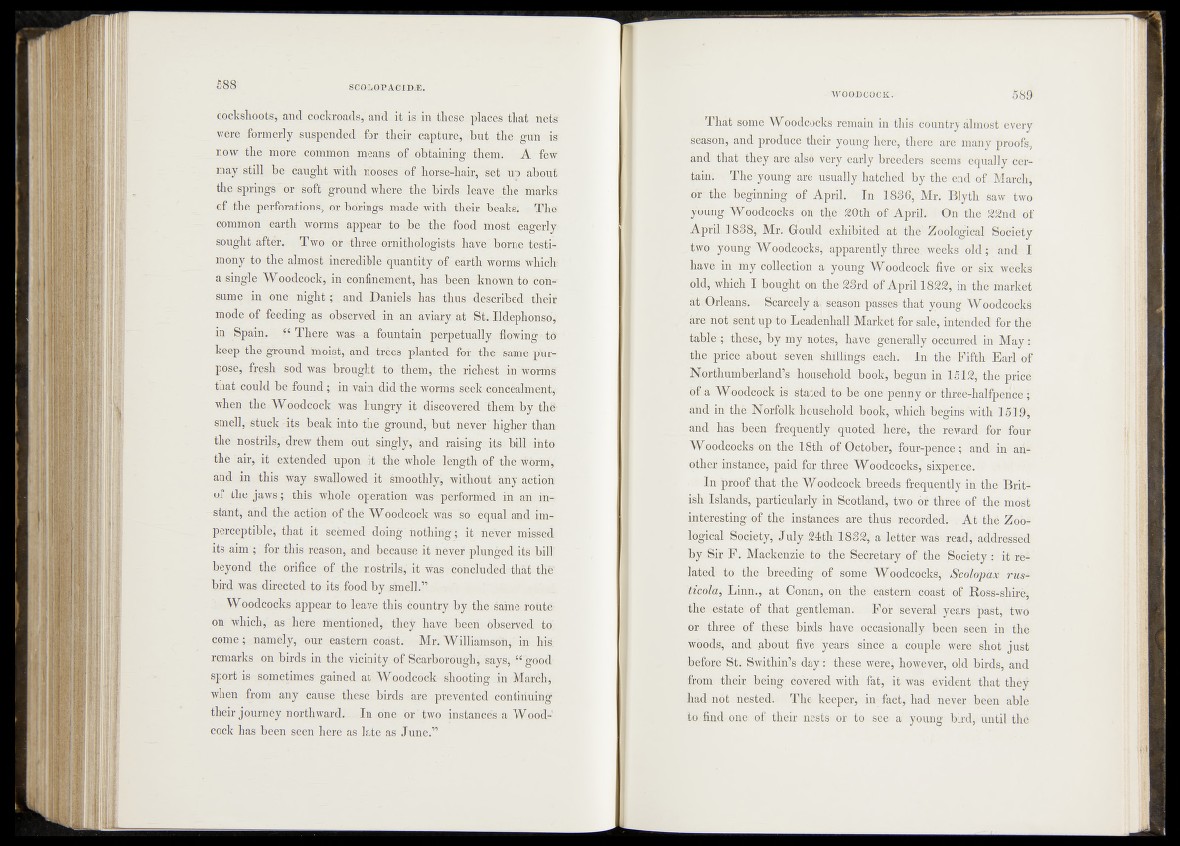
cockshoots, and cockroads,- ail'd, it is in these.' places that netk
were formerly suspènded for :theiï capture, but thé gun ::d&
now the more .coinraoh means _of obtaining them. À. ■ fey
ma^ still be caught with ribosès of horse-hair, set up ;âbém6
the spriugsTor soft ground where the birds, leave^the marks
of the perforations, or borings made with their beaks.' --The
common earth worms appear to Jbe the food most:-eagerly-
sought after. Two or -three ornithologists have'borne-lesti*.
mony ,to~the almost incredible quantity of’earth worta‘ss%Mch£
a single Woodcock, in confinement, hasssbeén known to ecaw
sume ;in one n ^ h t ÿ . and Daniels has thuSâvdescrjèéd^eii
mode of feeding as observed'in an àviary at
in Spain,, There was—n fountain perpetually., flewiii^dd
keep-the ground moist, and trées- planted fór thèh-s®$fhi'r^
pose, fresh sod was brought to them,, thé richeckin i'wor-ms
that could be found ; in vain did the worms-seekf^ncéalmeht^
whenlithmWbbdeoek was hungry it discovered ‘theta- b§rfh&
staell^sthekrits beak, into the groiind, but -neveriih^Ber than-
the nostrils, drew them but singly,,bud raising Hts; bill into-
the air, it extended upon it the. w.K<fle length of theawlkta^
and in this way Swallowed _it smoothly^ -witho’uf anyractroh
of thé jaws; this whole operation was->p'èrfe,rmedrin a i i j i ^
stain t, and the action of thé Woodcock.was' 's^éq>uàl^ah^FmT
perceptible, that it $#med; doîn|».’ hothiiîgt it never missed
its aim'; for this reason, and because if nevef plunged its^bill:
beyond the' orifice -©fAhe nostrils,' i t was téön<du#d'that th@
bird was directed to its. food by smell.11 ;
Woodfeoeksrapp^i-to leave: this èpüntEy by'the Same fohté
on w h ich,'as-hère mentioned; they ha^e.been óbservëdwé4
come ; -namely, our eastern coast. Mr. M^illiamsdh; • in hià;
remarks on birds in the vicinity of Sdàrbordugh; says, ^gbod;
sport is sometimes gained at Woodcoek- shooting in March,
whén from any cause these- birds are prevented epMijiuing
théjr journèy northward. In one br'two.’instances -a .W.oo’d-1
cock has been seen here as late as June.1’
- That-somd Woodcocks remain'in this country almost every
èeason, and produce, their yo’uhg here, there are many proofs,
and that-, they- are also very early .breeders seems equally certain:
The^ybiuiig'-are usually;hatched>by the end of. March;
ok the.. begihning&)f April. In l‘g0@y Mr. Blyth saw two
^dngiWdb'dcocks^ou thè 20tlr obApMlk?'€ n the 22nd of
Aptikl Mr.^CnouM. é^M*ÏÉfedirat ZodlogiCal Society
yM^^Wqbdeorcks,* apparently dhrhe#weëks old; and I
havein^§myt;éMfefctionv,tsg:'ybung Woódêg&ËI five or six weeks
bid, which* ! the'market
atrOrleahs.teSea-Bêbhy Woodcocks
|fEe*n Off sent up^to-'LeadenhalhMarket-dor'SsÈff'i-ntèndodlfor thè
,#ble?;> these; bpm^«et%sdjhat^ genially occurred in May-1
|the%rice-about^#4Ven^sMlliiig|!|©é^^ In the »Fifth Earl of
^orthumbeEland‘|s?^0nsehold bobk^begun in IS S ^ th e price
^ . a Woodcock M- stafedv-&)(be^®hk:q5ènny érlthrefe-halfpencè't;
and ik thfeM-^pJllfe 'housëhol€^Éfoi,‘lwlficli! begihs**with 15-1-9*,
js&t'd- hhsïibdeV^E^^S^^u'dirgd^hëlè/ififel reward fbri four
’wVteM%^^^n-the 18^K@i^Oq|;óht^^fe®É!^eneef; and in am
othediftstanre, -paid fo^Éèëfe'- W b f^ a tk s, siibpenbe.-¥
-5 In prö’bftóh^t^tÈé'.Wo’odöockii br JfeEsifrequently in the Brit-*
ishilslantkf, -particUlafly in -SGoklandyt twototf thre^<ff>*thd imM;
ksteresiting#frthe'.instance’s^are -tlhisjsrecorded^: At thé Zohf
Ü g k al Society,srDuly 2èthMili^a-fiefctlfewas read, addressed
by-Sir F . Mackenzïeptó* theSjSfflMaryeöf, the ^odetyb? ifcrêf.
lated to the br-éèdit^bf some Woodeb'eks;-. JSbdlopdx ruW
ticola, Linn., Conkn%<É)fftbeïteastern' coast-’öf 'Ross-shirê*
the* estate' of- that gentleman *s*F©r -seveM«years jpast, tw'b
or 'threëv of tjjfêse birds: !h^»otGas4©nafl^ beên -seen in the
woods, andi-.about couple were shot just
before Sfcj Swithin’s day’h theseaweref1 h.ejj#yer,? Old birds, and
!$Kfflor their peaaag» drèrëi^tmtkfBtynt'cwaS'. evident that they
had nbt-.nested^n'TIfei^ehpb^imfact, had nê-ver,beën able
to : find-oaetofi their nests-oibtb see n young bird; until thé